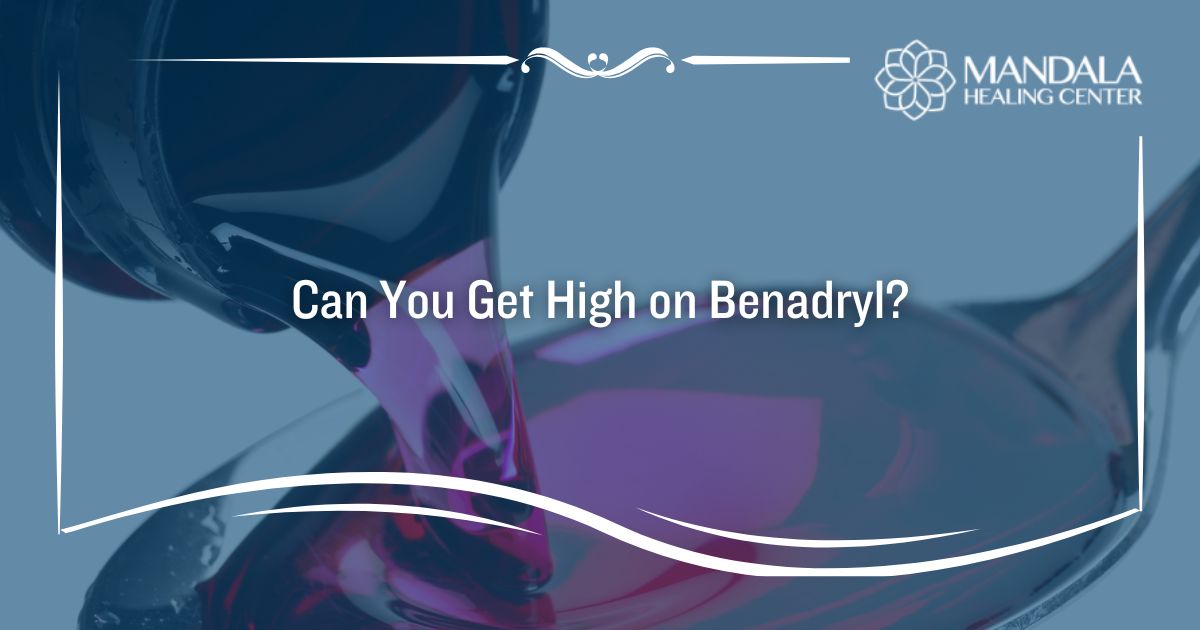Benadryl is one of the most common over-the-counter allergy medications. It contains diphenhydramine, which is an antihistamine that blocks your body from producing histamines during allergic reactions.
If you’ve taken Benadryl, you know it can cause side effects like drowsiness and fatigue. What you might not know is that some people abuse Benadryl to experience a high. When taken in high doses, diphenhydramine can cause extreme drowsiness, confusion, paranoia, loss of coordination, and severe hallucinations.
Because of an internet phenomenon called the “Benadryl challenge” kids and teens began taking large doses of Benadryl to experience hallucinations. Unfortunately, doing so is incredibly dangerous. You could experience a life-threatening overdose when consuming high amounts of diphenhydramine.
According to the Centers for Disease Control and Prevention (CDC), about 18% of the 92,033 drug overdoses from 2019 to 2020 involved antihistamines like diphenhydramine.[1]
If you or a loved one regularly abuses Benadryl, the Mandala Healing Center can help you recover.
In this article, you will learn:
- What is Benadryl?
- Can Benadryl cause a high?
- What is the “Benadryl challenge?”
- Can you overdose on diphenhydramine?
What is Benadryl?
Benadryl is an over-the-counter (OTC) allergy medication. The active ingredient in Benadryl is diphenhydramine, which can prevent allergy symptoms by blocking the release of histamine.
You can use Benadryl to treat:[2]
- Cough and cold or hay fever
- Runny nose
- Itching from insect bites or hives
- Motion sickness
- Insomnia as a sleep aid
It takes Benadryl to begin working within 15 to 30 minutes and lasts for about 4 to 6 hours. While Benadryl is generally considered a safe medication to take, you should still be cautious when consuming it. You should never mix it with alcohol or other central nervous system depressants.
Additionally, older adults may have an increased risk of confusion, drowsiness, watery eyes, blurred vision, and heart problems when taking Benadryl.
Does Benadryl Get You High?
Benadryl will not cause a high if you use the recommended amount found on the label. However, some people use large doses of Benadryl to experience a high.
The common side effects of Benadryl include:[3]
- Dry mouth, nose, and throat
- Dizziness and drowsiness
- Nausea and vomiting
- Loss of appetite
- Constipation
- Increased chest congestion
- Headache
- Muscle weakness
- Excitement and nervousness
If you abuse a large amount of Benadryl, you might experience adverse reactions like confusion and delirium, extreme drowsiness, rapid heart rate or arrhythmias, hallucinations, and even seizures. People who abuse diphenhydramine on purpose do so to experience sedative and hallucinogenic effects.
What is the “Benadryl Challenge?”
The “Benadryl challenge” is a trend that started in 2020 on TikTok. Users were encouraging teens and young adults to take high doses of Benadryl to experience a sedative and hallucinogenic high. The trend was basically to see how much Benadryl your body could handle.
This trend is extremely dangerous, as it encourages young people to take doses of Benadryl that could lead to an overdose. The Food and Drug Administration (FDA) reports that “taking higher than recommended doses of the common over-the-counter (OTC) allergy medicine diphenhydramine (Benadryl) can lead to serious heart problems, seizures, coma, or even death.”[4]
If you or a loved one regularly abused Benadryl, you should seek help from a professional drug and alcohol rehab program. Even short-term abuse could lead to addiction. At the Mandala Healing Center, we offer the tools and support you need to achieve long-term recovery.
Can You Overdose on Benadryl?
Taking Benadryl in high doses can lead to a life-threatening overdose. The recommended dosage of diphenhydramine is 25 to 50 mg every 4 to 6 hours. During the “Benadryl challenge,” people are encouraged to take much higher doses than this.
If you take more than 500 mg of Benadryl in a single day, you will experience serious toxicity. That said, overdoses can occur at smaller dosages as well.
The symptoms of Benadryl overdose include:[5]
- Extreme drowsiness
- Mental confusion
- Dilated or enlarged pupils
- Trouble urinating
- Dry mouth
- Hallucinations and delusions
- Seizures
- Coma and death
If you or someone you love is experiencing a Benadryl overdose, contact 911 immediately. Once they are treated for the overdose, they can transfer from the hospital to an addiction treatment center to overcome their substance abuse issues.
Get Connected to a Drug and Alcohol Rehab Program
Benadryl abuse can be incredibly dangerous, especially if you are using large doses. Additionally, you can develop an addiction to Benadryl. Because of this, you should always seek help from a professional addiction treatment center to overcome diphenhydramine addiction.
At the Mandala Healing Center, we use an individualized and evidence-based approach to Benadryl addiction treatment. You’ll receive a variety of services, including medical detox, individual therapy, group counseling, and relapse prevention planning.
Why Choose The Mandala Healing Center? Clients are taken on a journey of healing through complete immersion into evidence-based clinical modalities, multifaceted alternative therapies, and expert medical management, allowing them to fully detox and recover from drug and alcohol addictions. Through a program of care designed to encourage change, a foundation is created that allows clients to find their higher purpose and reclaim their lives.
Contact us today to learn more about how we can help you recover.
References:
- The Centers for Disease Control and Prevention (CDC): Notes from the Field: Antihistamine Positivity and Involvement in Drug Overdose Deaths — 44 Jurisdictions, United States, 2019–2020
- The National Library of Medicine (NLM): Diphenhydramine
- Medline Plus: Diphenhydramine
- The Food and Drug Administration (FDA): FDA warns about serious problems with high doses of the allergy medicine diphenhydramine (Benadryl)
- Taylor and Francis Online: Diphenhydramine and Dimenhydrinate Poisoning: an Evidence-Based Consensus Guideline for Out-of-Hospital Management
















